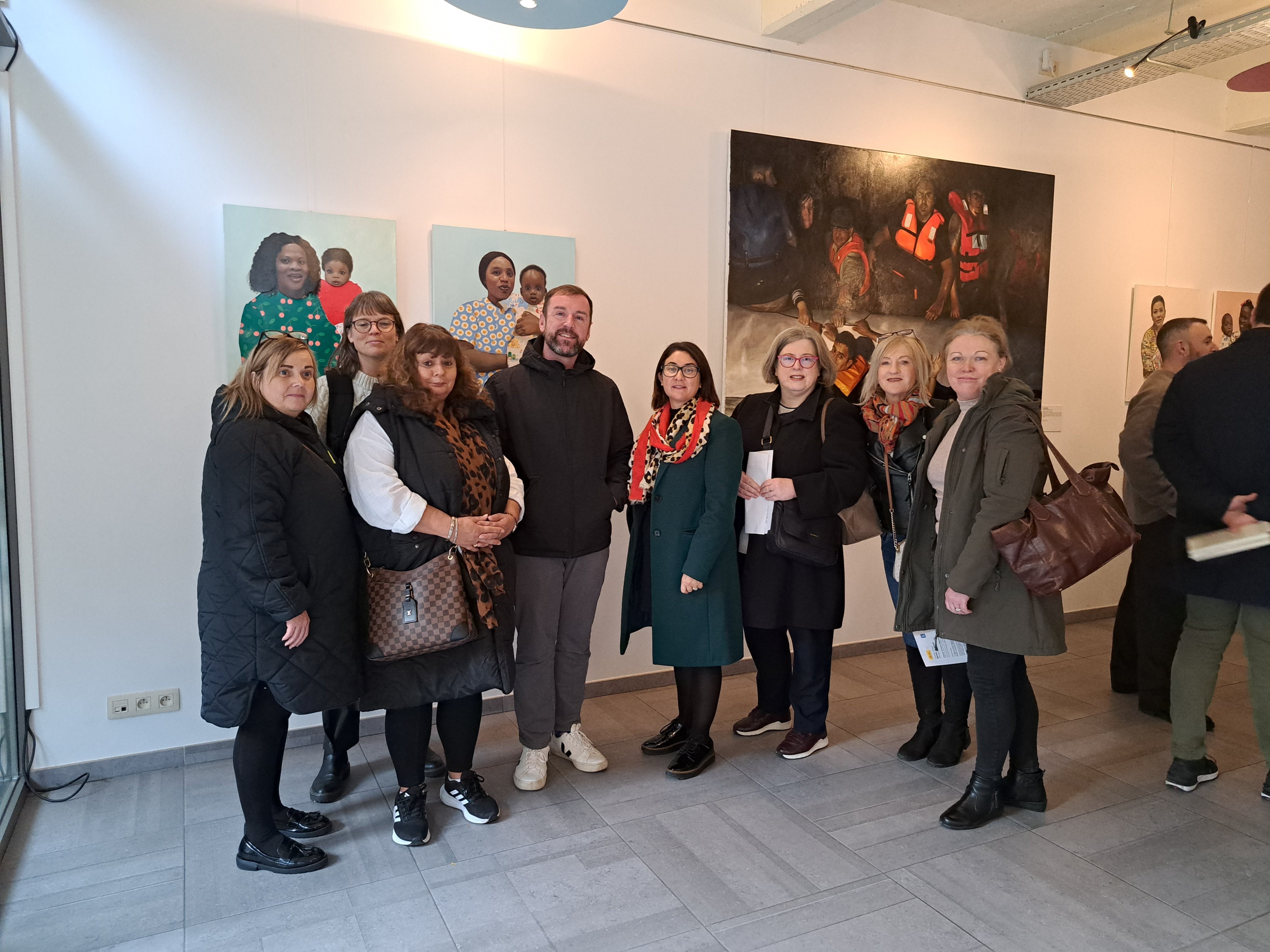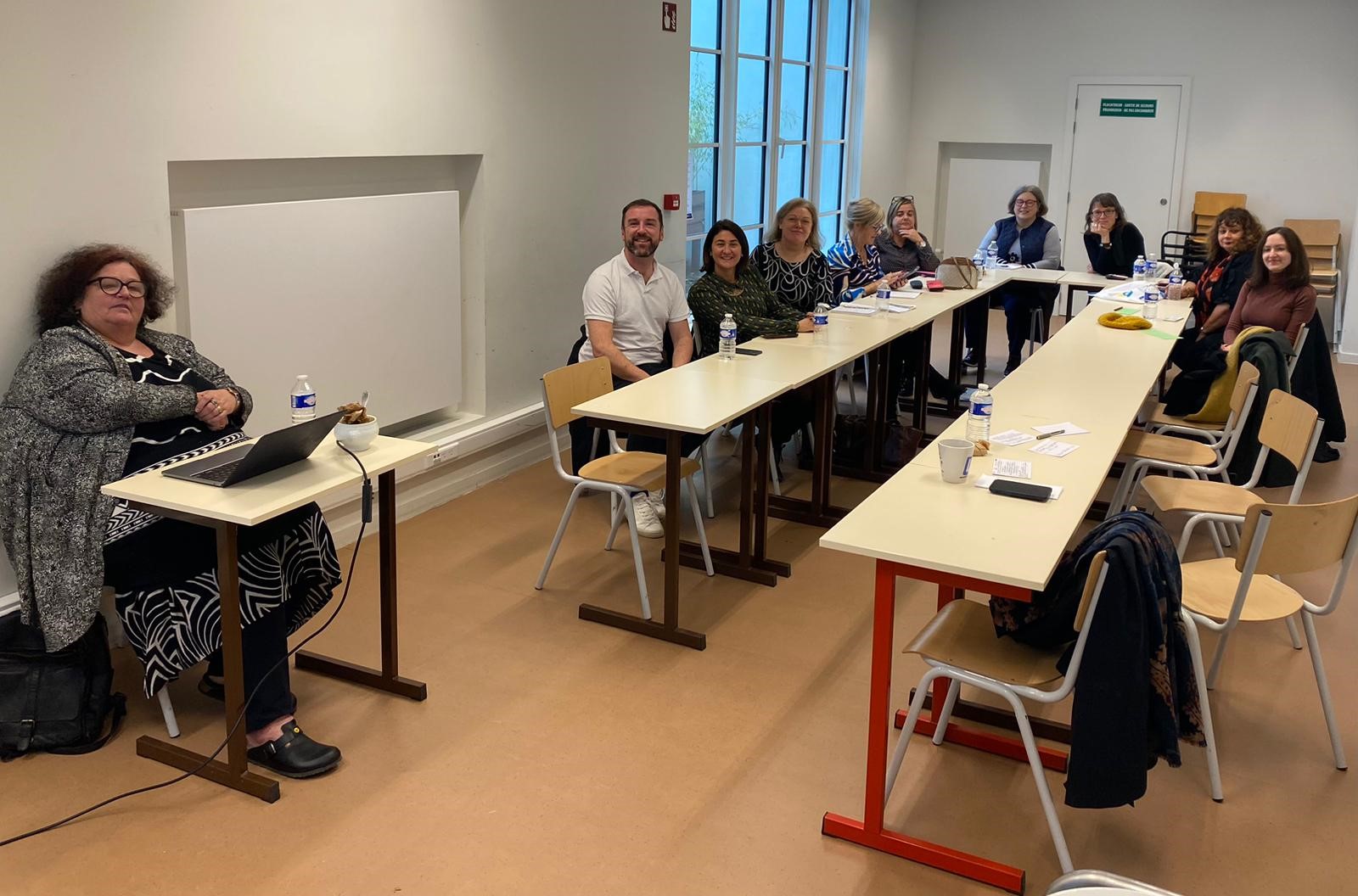This is an Erasmus+ accredited project, focusing on our Community Education Network (CEN) members, with 12 members involved overall in a consortium. The goal with these mobilities is to help staff and learners find out about different approaches to adult and community education, to share knowledge and ideas, and find practical actions that people can bring back to their work or learning in Ireland.
Last November, 8 members from the CEN travelled to Brussels for job shadowing with the European Association for the Education of Adults (EAEA).

These 8 CEN members all work in community education with groups of people from under-resourced communities or people who are marginalised in our society.
Speaking about the project, our Community Education Officer Lorraine O’Connor said:
“This project is extremely important in providing a unique international learning experience for our members. On our job shadowing visit to Brussels, we learned about the innovative methods our European counterparts are using in their educational spaces. The consortium members all agreed that they would use what they learned in their own programmes. This is the beauty of having an opportunity to learn from others. This project is unique because it truly enhances learning from the personal to the political, and offers a space for people who may not have the opportunity before to engage in new kinds of learning.”
We asked the members involved what they would like to focus on and learn about on this mobility. The consensus was the need to learn more about working with and support migrants, refugees, and asylum seekers.
According to Lorraine, “for people working and learning in Community Education, it can be difficult to find the time and money to access training. So we are delighted to be able to facilitate this opportunity for people.”

The Brussels job shadowing visit, which was co-developed with the EAEA, focused on the theme of social inclusion, with some additional focus on sustainability, and digital and social literacy.
The group visited two migrant centres to see how adult staff there work with migrants, especially those dealing with trauma and PTSD. The group also met with Maks vzw, to learn about digital storytelling and how to amplify the voices of those who do not get heard. They explored the idea of literacy as a practice of empowerment with Lire et Ecrire. Additionally, they visited VIA - “Bureau d'accueil pour primo-arrivants" - which translates as a “reception desk for newcomers”, where migrants are supported to find their way both professionally and personally.
Next the group went to the Museum of Migration and the opening of the exhibition “Being Human”, organised in collaboration with the Spanish Presidency.
Back at the EAEA offices, the group met with Andrei Frank, Policy and Advocacy Coordinator at the Lifelong Learning Platform, who discussed what is happening in European policy and how this will impact Ireland.
I have learned a lot from this experience, and it will influence my work. I was particularly interested in the presentation from Veronique De Leener, the founder and director of Maks, who spoke about working with prisoners, with a focus on digital skills, will also recognising issues with literacy and language barriers. The needs of learners were very much the focus, with skills such as integration into the labour market, including CV and interview skills. This organisation reacts to the needs of their community.
When we visited Lire et Ecrire, Louise Culot, their Research and Analysis Coordinator, talked about how, in order to achieve a quality learning environment, the material needs to be visually appealing, interesting, and it needs to encourage participation. Plain language is essential.
At the VIA migrant centre, David Declerque gave a very interesting and informative presentation on their work with integrating and supporting newcomers to Brussels. This includes basic information on citizenship and language. The “Being Human” exhibition at the Museum of Migration was a very moving experience and an honest portrayal of the experiences of those who have had to leave their homes and the lengths they must go through to make a new life for themselves and their families.
Throughout the job shadowing visit, there was a common theme of the need for visual community when dealing with barriers like different languages, and challenges with literacy and digital skills.
When we met the director of Maks Veronique de Leener, she told us that Maks works with marginalized groups and people who live in poverty, and in Belgium that means people who earn less than €700 per month. In order to deal with language and communication barriers, they use digital storytelling, which is a method we use as well in Blue Teapot. Veronique also mentioned they use puppets and Lego to convey a social issue as it is easier to work this way than to tell from a personal perspective. This is something we have noticed in Blue Teapot as well. One thing I took home from this visit is the Video CV, which is a brilliant way for employers to avoid biases against people with disabilities, and it gives a better idea of the person applying for the job.
Also during this mobility, we met Andrei Frank from the Lifelong Learning Platform, who told us that their lobbying activities with the European Parliament and Commission are focused on validation of further and community education and RPL. As we all work locally in our areas, it is nice to know what is happening on a larger scale. This mobility also gave us the opportunity to get to know more about other people working in adult and community education in Ireland and the common problems we all face, such as QQI (Quality and Qualifications Ireland) validation, revalidation, and re-engagement, and the cost of being a certified provider and the lack of recognition for community education in Ireland.
I was nervous about travelling on my own for the first time, but Lorraine met me at Dublin Airport, and from the moment I met my fellow attendees I knew the next few days would be full of fun and learning. I was particularly struck by the “Being Human” exhibition, which told us about the stories of amazing, strong, courageous people. I would highly recommend any AONTAS members to avail of these opportunities. I learned so much from this job shadowing, and made new friends too.
I was particularly impressed to hear of the exemplary work of Véronique and her team at Maks, who use digital storytelling to amplify the voices of those who don’t get heard. It was also very interesting to meet with Louise at Lire et Écrire and hear about some of the methods and tools they use to make quality literacy training accessible to all. And to hear from Andrew from Lifelong Learning Platform about policy and advocacy opportunities with our European stakeholders.
This job shadowing opportunity was a truly amazing experience, with Lorraine O’Connor as our guide. The group was so nice and friendly, and there was a wealth of knowledge and information on adult education. The centres were just like being at home in our centres the same atmosphere and the people. We learned a lot about Brussels and their stance on adult education, which I found was very much the same way we do it here in Ireland.
When we went to the Cosmos Social Enterprise Centre, we learned about the benefits of using digital storytelling to support vulnerable people, and you could really feel and see the importance of this centre to the community, but also how important the local community was to Cosmos. At Lire et Ecrire, a community education provider that advocates for literacy support and delivers literacy support programmes. I found their approach to literacy support very interesting especially the methods and tools that are implemented into their programmes, i.e. the use of lots of visuals. When we visited Via Asbl-BAPA, I was very impressed with their holistic and empathetic approach to supporting new migrants and their families with integrating into society and settling in a new country. And the “Being Human” exhibition, which was very moving, featured a series of paintings exploring the realities of migrants and refugees trying to reach Europe and the risks they take when crossing the sea at night in small over-crowded boats. I have learned so much from this experience. Many of the strategies, supports, and tools could be implemented into our programmes here in Ireland.
These mobilities are part of a KA (Key Action) 1 Erasmus+ project funded by the European Union. Apply for similar funding in Ireland through Léargas.
For more opportunities, keep an eye on our website and find us on social media